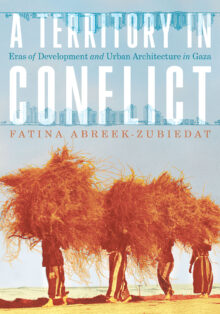
Fatina Abreek-Zubiedat
Fatina Abreek-Zubiedat is assistant professor of architectural history and criticism at the Tel Aviv University and head of the research lab Spaces-in-Transition.
A Territory in Conflict
Eras of Development and Urban Architecture in Gaza
A Territory in Conflict explores Israeli and Palestinian projects of modernization and development in the Gaza Strip, from the outset of Israel’s military occupation in 1967 to the Oslo Accords of 1993. Rather than reduce the Gaza Strip to an arena of war and violence, Fatina Abreek-Zubiedat resurrects the urban and architectural history of Gaza’s cities and the varied perspectives and identities of the people who shaped them. Through a close examination of planning activities in occupied Palestinian territory focusing on development, settlement, and security, her book highlights the collision between Israeli occupation, Palestinian nationalism, and regional peace processes; politics of class and citizenship; contestation between camps and cities; and the tensions inherent in Israeli development policies designed to establish lasting control over the territory’s demographics and resources. Abreek-Zubiedat probes the power of architecture in conflict zones, illustrating the agency of Gaza’s cultural elite: its mayors, architects, and engineers. At the same time, she draws attention to alternative voices, Gaza’s local inhabitants and refugees—illuminating the conflicts, complexities, and contradictions of settler colonialism in the Middle East. Her innovative approach to urbanization, resettlement, and rehabilitation in the Gaza Strip offers a groundbreaking account of the Israel-Palestine conflict that goes beyond the limited framework of colonizer/colonized binary, restoring Gaza’s cities in the public eye and giving voice to the people who inhabit them.

